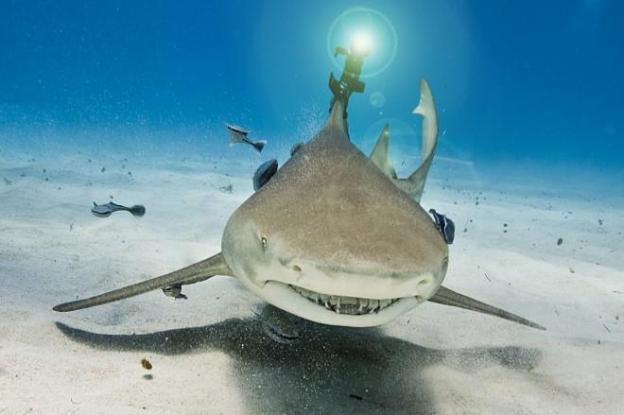
Remember that Facebook campaign last week when Wicked Lasers promised it will attach one of its Spyder 3 laser light onto a live shark if enough people Liked their post? It would appear the company has already gone and done it thanks to the overwhelming response by its fans worldwide.
Marine biologist and television personality Luke Tipple was elected to venture down under to attach a 50-milliwatt green laser to an unsuspecting lemon shark swimming off the coast of the Bahamas. Despite believing the campaign was a bit pointless, Tipple quickly turned around and agreed to the task after finding more uses for laser clips on a large marine life.
“This was definitely a world first,” Tipple told Wired. “Initially, I told them no. I thought it was a frivolous stunt. But then I considered that it would give us an opportunity to test our clips and attachments… [and] it was a low-powered laser that couldn’t be dangerous to anyone.”

“There’s actually useful applications in having a laser attached to the animal,” Tipple said. “Although further testing is necessary, time and time again, sharks were actually attracted to the laser beam.” The team continued to use the laser to attract the shark, as well as tracked and recorded its body movements to measure the animal’s trajectory and speed.
While the term Laser Shark may be much more epic than laser cats, no animals were hurt in the process, divers included. The team selected the lemon shark because of its docile swimming patterns in shallow parts of the water so it wouldn’t easily run away if it didn’t react well to the attachment. Lemon sharks also have a perfectly-sized fin to match the clamp attachment. As far as the concerns of other animals possibly being blinded by the lasers?
“The laser we were using wasn’t strong enough to cause ocular or thermal damage to other sea life,” Tipple said. But even if they could attach stronger lasers to the shark, Wicked Lasers said it’s stopping at the tiny 50-milliwatt version.
“Depending on the power of the laser that they are armed with, the sharks could be significantly more dangerous,” Steve Liu, Wicked Lasers CEO, told Wired. “If there was a way the shark could operate the laser on its own accord and use it against humans, we wouldn’t even attempt this.”
If that day ever existed, it would truly be the world Dr. Evil has always dreamed up.


